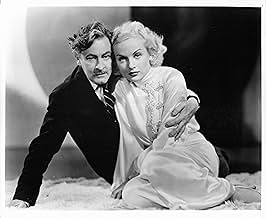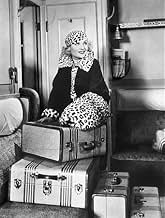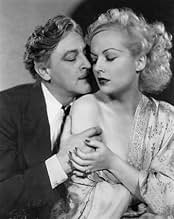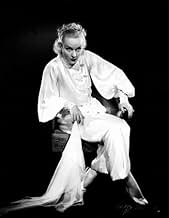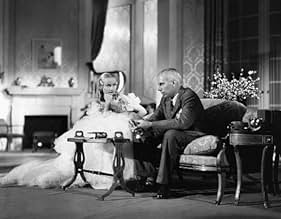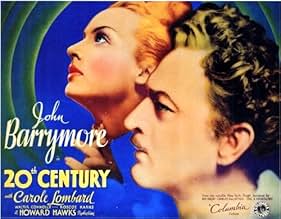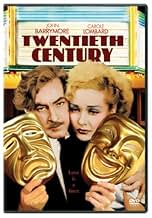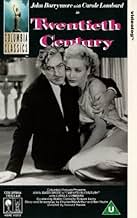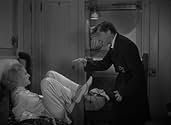IMDb-BEWERTUNG
7,2/10
7576
IHRE BEWERTUNG
Füge eine Handlung in deiner Sprache hinzuA flamboyant Broadway impresario who has fallen on hard times tries to get his former lover, now a Hollywood diva, to return and resurrect his failing career.A flamboyant Broadway impresario who has fallen on hard times tries to get his former lover, now a Hollywood diva, to return and resurrect his failing career.A flamboyant Broadway impresario who has fallen on hard times tries to get his former lover, now a Hollywood diva, to return and resurrect his failing career.
- Auszeichnungen
- 4 Gewinne & 1 Nominierung insgesamt
Charles Lane
- Max Jacobs
- (as Charles Levison)
Bobby Barber
- Sign Painter
- (Nicht genannt)
Herman Bing
- Beard #1
- (Nicht genannt)
Lynton Brent
- Train Secretary
- (Nicht genannt)
Anita Brown
- Black Stage Showgirl
- (Nicht genannt)
James Burke
- Sheriff
- (Nicht genannt)
James P. Burtis
- Train Conductor
- (Nicht genannt)
Eddy Chandler
- Cameraman
- (Nicht genannt)
Nick Copeland
- Treasurer
- (Nicht genannt)
Empfohlene Bewertungen
Down but not quite out, a megalomaniacal theatrical producer schemes to get his former star & lover back under contract during a wild ride on the TWENTIETH CENTURY Limited racing from Chicago to New York City.
Directed by Howard Hawks from an inspired script by Ben Hecht & Charles MacArthur, this is one of the seminal screwball comedies which would set the high-water mark for years to come - zany characters, living at a frenetic pace, throwing outrageous lines at each other. While the situations are completely unrealistic it makes no matter. Films like this were calculated to lift Depression audiences out of their troubles for an hour or so; today, we long for them to work that old magic again.
In a large & spirited cast there is one eminence, one name above the title, one peak ascending over the smaller hills. John Barrymore, a lifetime of theatrical history and private dissolution etched on his remarkable face, is a grade A ham as the unspeakable Oscar Jaffe, willing to break any convention, law or dogma to get what he wants. Cajoling, pleading, threatening, cooing like a dove, screeching like a banshee, Barrymore is utterly mad, unspeakably obnoxious & thoroughly delightful. He doesn't just dominate the film, he overwhelms it like a thick wave of brimstone & honey. Watching him infuriate his players by chalking their movements on the floor, disguise himself as an elderly Southern gentleman in order to sneak aboard the train, or arranging his own fake death scene to serve his egotistical ends, is to watch a master of the acting art play a comedic role worthy of him.
Carole Lombard is lovely, but completely overshadowed by Barrymore. Her character, while that of a great star, is pitched at a more normal tilt and exists to react to his enormities. While she's wonderful to watch, it's impossible to forget to whom the film really belongs.
The rest of the cast is first rate. Barrymore's two faithful factotums are played by dyspeptic Walter Connolly and sardonic, boozy Roscoe Karns, both of whom have learned to deal with The Master's dictums in different ways. Hatchet-faced Charles Lane plays a director who becomes Barrymore's theatrical blood rival. Edgar Kennedy burnishes his few scenes as a private eye who's no match for an enraged Lombard. Handsome Englishman Ralph Forbes plays against type as a spoiled society boy who thinks he's in love with Lombard. And for sheer looniness there's chittering little Etienne Girardot, playing a benignly mad gentleman wandering about the train plastering large REPENT stickers on every available surface.
Movie mavens will recognize Herman Bing & Lee Kohlmar as the uncredited & hilarious Passion Players from Oberammergau.
Directed by Howard Hawks from an inspired script by Ben Hecht & Charles MacArthur, this is one of the seminal screwball comedies which would set the high-water mark for years to come - zany characters, living at a frenetic pace, throwing outrageous lines at each other. While the situations are completely unrealistic it makes no matter. Films like this were calculated to lift Depression audiences out of their troubles for an hour or so; today, we long for them to work that old magic again.
In a large & spirited cast there is one eminence, one name above the title, one peak ascending over the smaller hills. John Barrymore, a lifetime of theatrical history and private dissolution etched on his remarkable face, is a grade A ham as the unspeakable Oscar Jaffe, willing to break any convention, law or dogma to get what he wants. Cajoling, pleading, threatening, cooing like a dove, screeching like a banshee, Barrymore is utterly mad, unspeakably obnoxious & thoroughly delightful. He doesn't just dominate the film, he overwhelms it like a thick wave of brimstone & honey. Watching him infuriate his players by chalking their movements on the floor, disguise himself as an elderly Southern gentleman in order to sneak aboard the train, or arranging his own fake death scene to serve his egotistical ends, is to watch a master of the acting art play a comedic role worthy of him.
Carole Lombard is lovely, but completely overshadowed by Barrymore. Her character, while that of a great star, is pitched at a more normal tilt and exists to react to his enormities. While she's wonderful to watch, it's impossible to forget to whom the film really belongs.
The rest of the cast is first rate. Barrymore's two faithful factotums are played by dyspeptic Walter Connolly and sardonic, boozy Roscoe Karns, both of whom have learned to deal with The Master's dictums in different ways. Hatchet-faced Charles Lane plays a director who becomes Barrymore's theatrical blood rival. Edgar Kennedy burnishes his few scenes as a private eye who's no match for an enraged Lombard. Handsome Englishman Ralph Forbes plays against type as a spoiled society boy who thinks he's in love with Lombard. And for sheer looniness there's chittering little Etienne Girardot, playing a benignly mad gentleman wandering about the train plastering large REPENT stickers on every available surface.
Movie mavens will recognize Herman Bing & Lee Kohlmar as the uncredited & hilarious Passion Players from Oberammergau.
Funny and intelligent comedy features a brilliant performance by Barrymore, spoofing his earlier "Svengali" role. He looks and acts a lot like Peter Sellars would in later similar performances; now morose, then practically jumping with energy. Lombard also turns in a right-on performance.
Here is a film where Hawks really finds his mark, because the comedic action is perfectly timed, flows nicely, and feels natural, and even includes some early Hawks "overlapping dialogue".
Hardly a dull moment, miles above its peers.
Here is a film where Hawks really finds his mark, because the comedic action is perfectly timed, flows nicely, and feels natural, and even includes some early Hawks "overlapping dialogue".
Hardly a dull moment, miles above its peers.
Director Howard Hawks, impressed by Carole Lombard acting skills in her recent movies, took a gamble by giving the biggest role to her yet in May 1934's "Twentieth Century." The twenty-six year old actress had never been placed in such a prominent part in a big-budgeted major Hollywood movie before, this playing opposite the legendary, but temperamental John Barrymore. Hawks stuck out his neck to cast her as Mildred Plotka, a lingerie model-turned-actress, despite several more popular stars wanting the part for the Columbia Pictures movie.
Thus, the director was somewhat puzzled by Lombard's lack of spark in the first few days of filming. Hawks speculated it was either through a case of the jitters or from her previous experiences playing unemotional roles that was causing her to hold back. During a break, Hawks posed a question to the actress about what she would do if she heard from others that Barrymore said something derogatory about her behind her back. Lombard replied she would kick him in the groin. "Well, Barrymore said that, so why don't you kick him?" Such backstabbing got her blood pressure up, and she tore into the bewildered Barrymore, the actor not knowing where she was coming from. From that moment on, Lombard played Mildred with the energy Hawks was expecting from her. In fact, Barrymore, who played opposite of many of the screen's most respected veteran actresses, wrote on a photograph of himself to Lombard after filming wrapped, "To the finest actress I have worked with, bar none."
"Twentieth Century" is labeled as one of film's earliest screwball comedies. Adapted from a Charles Millholland unproduced play, 'Napoleon of Broadway,' the work was based on long-time eccentric theater producer David Belasco. He's the one who gave Gladys Marie Smith her stage name, Mary Pickford, reworking the young actress' middle name while selecting her mother's maiden name. The Ben Hecht/Charles MacArthur script shows Oscar Jaffe (Barrymore) treating Mildred (Lombard) harshly during the first days of a play's rehearsal. In one controversial scene where he wants the restrained Mildred to scream, Oscar picks up a sharp pin and jabs her in the buttocks. The incoming head of the Hays Production Code Office, Joseph Breen, not yet in total control of the censor bureau, was troubled with Barrymore's action with the pin.
Hawks had shot a close-up of the pin's penetration into the buttocks, which Breen promptly excised.
Barrymore was approached by Hawks to play the quirky stage producer. The actor asked why would the director think he was a good fit for the role? "It's the story of the biggest ham on earth, and you're the biggest ham I know," said Hawks. Barrymore agreed. Once filming began, the director encouraged his two leads to ad-lib their dialogue. He recalled later, "When people are as good as those two, the idea of just sticking to lines is rather ridiculous." Despite Barrymore's problematic drinking causing delays and reshoots in his recent productions, he was more dedicated to his craft under Hawks' watchful eye. In a rare day's absence from an evening of heavy drinking, Barrymore was so distraught he offered to work for two days for free. He made suggestions in several scenes that are seen on the screen, such as his disguise as a Kentucky Colonel to sneak onto the Twentieth Century train, which at the time was the most modern and fastest train used for the Chicago-New York express.
Lombard and Hawks were aware of Columbia studio head Harry Cohn's habit of making physical passes at new actresses working on his pictures, which he did with Carole. Cohn scheduled a meeting with the director in his office on the progress of the film. While the two were in conversation with Hawks far off to one side, Lombard barged in and exclaimed "I've decided to say yes!" pretending as though the studio president was alone. With the puzzled Cohn's mouth wide open, the actress began removing some of her clothes. Then Hawks cleared his throat and said, "I'd better get out of here if this is the kind of studio you run." The flustered Cohn politely asked the two to leave. The actress never got a wayward grouping of Cohn's hands nor any free-love comments from him again.
Lombard always remembered Hawks' sneaky maneuver at the expense of Barrymore to make her a better actress. Before every movie she was appeared, she sent the director a telegram announcing "I'm going to kick him." "Twentieth Century" proved pivotal in Lombard's career, with studios offering her larger, more prominent roles while her popularity soared worldwide.
Thus, the director was somewhat puzzled by Lombard's lack of spark in the first few days of filming. Hawks speculated it was either through a case of the jitters or from her previous experiences playing unemotional roles that was causing her to hold back. During a break, Hawks posed a question to the actress about what she would do if she heard from others that Barrymore said something derogatory about her behind her back. Lombard replied she would kick him in the groin. "Well, Barrymore said that, so why don't you kick him?" Such backstabbing got her blood pressure up, and she tore into the bewildered Barrymore, the actor not knowing where she was coming from. From that moment on, Lombard played Mildred with the energy Hawks was expecting from her. In fact, Barrymore, who played opposite of many of the screen's most respected veteran actresses, wrote on a photograph of himself to Lombard after filming wrapped, "To the finest actress I have worked with, bar none."
"Twentieth Century" is labeled as one of film's earliest screwball comedies. Adapted from a Charles Millholland unproduced play, 'Napoleon of Broadway,' the work was based on long-time eccentric theater producer David Belasco. He's the one who gave Gladys Marie Smith her stage name, Mary Pickford, reworking the young actress' middle name while selecting her mother's maiden name. The Ben Hecht/Charles MacArthur script shows Oscar Jaffe (Barrymore) treating Mildred (Lombard) harshly during the first days of a play's rehearsal. In one controversial scene where he wants the restrained Mildred to scream, Oscar picks up a sharp pin and jabs her in the buttocks. The incoming head of the Hays Production Code Office, Joseph Breen, not yet in total control of the censor bureau, was troubled with Barrymore's action with the pin.
Hawks had shot a close-up of the pin's penetration into the buttocks, which Breen promptly excised.
Barrymore was approached by Hawks to play the quirky stage producer. The actor asked why would the director think he was a good fit for the role? "It's the story of the biggest ham on earth, and you're the biggest ham I know," said Hawks. Barrymore agreed. Once filming began, the director encouraged his two leads to ad-lib their dialogue. He recalled later, "When people are as good as those two, the idea of just sticking to lines is rather ridiculous." Despite Barrymore's problematic drinking causing delays and reshoots in his recent productions, he was more dedicated to his craft under Hawks' watchful eye. In a rare day's absence from an evening of heavy drinking, Barrymore was so distraught he offered to work for two days for free. He made suggestions in several scenes that are seen on the screen, such as his disguise as a Kentucky Colonel to sneak onto the Twentieth Century train, which at the time was the most modern and fastest train used for the Chicago-New York express.
Lombard and Hawks were aware of Columbia studio head Harry Cohn's habit of making physical passes at new actresses working on his pictures, which he did with Carole. Cohn scheduled a meeting with the director in his office on the progress of the film. While the two were in conversation with Hawks far off to one side, Lombard barged in and exclaimed "I've decided to say yes!" pretending as though the studio president was alone. With the puzzled Cohn's mouth wide open, the actress began removing some of her clothes. Then Hawks cleared his throat and said, "I'd better get out of here if this is the kind of studio you run." The flustered Cohn politely asked the two to leave. The actress never got a wayward grouping of Cohn's hands nor any free-love comments from him again.
Lombard always remembered Hawks' sneaky maneuver at the expense of Barrymore to make her a better actress. Before every movie she was appeared, she sent the director a telegram announcing "I'm going to kick him." "Twentieth Century" proved pivotal in Lombard's career, with studios offering her larger, more prominent roles while her popularity soared worldwide.
Howard Hawks' early foray into screwball comedy pits the wonderful pairing of John Barrymore and Carole Lombard against each other. She is Lily Garland, a Broadway actress about to break in Hollywood; he's her theatrical producer and on-off beau, desperate for her to stay. Around half of the film is taken up with them screeching at each other, leaving the supporting actors with very little to do.
There is a lot of sparkle here, great performances from the two leads, who work together just fine, and a screenplay which moves almost as fast as the train which gives the movie its title. Ten years after this was made, both Barrymore and Lombard were dead, but this stands as a fine epitaph for them together.
There is a lot of sparkle here, great performances from the two leads, who work together just fine, and a screenplay which moves almost as fast as the train which gives the movie its title. Ten years after this was made, both Barrymore and Lombard were dead, but this stands as a fine epitaph for them together.
Why this loud talky mess gets top ratings from professionals stumps me (TMC, Maltin, et al.). The only thing I can figure is they're overly impressed by pedigree—namely Hawks, Lombard, Barrymore, and the writing team of Hecht and MacArthur. But once you get past the legendary reputations, the results are more annoying than impressive. It seems someone confused frenetic with amusing, while the arm waving babble is simply non-stop. It's like everyone will laugh if you just say it loud enough with enough spastic energy.
Barrymore, in particular acts like he's heck-bent on climbing the walls. But the lines aren't funny, and neither are the situations—reputations or no. Maybe the screenplay is aimed at show-biz types who will catch on to esoteric inside jokes. Some such is the only explanation I can think of. Hawks, fortunately, appears to have learned his lesson. His Binging Up Baby (1938) amounts to a masterpiece of madcap. It's everything this indulgent mess isn't, but should be. There appears to be a moral to this movie, but whatever it is, it's not a good one.
Barrymore, in particular acts like he's heck-bent on climbing the walls. But the lines aren't funny, and neither are the situations—reputations or no. Maybe the screenplay is aimed at show-biz types who will catch on to esoteric inside jokes. Some such is the only explanation I can think of. Hawks, fortunately, appears to have learned his lesson. His Binging Up Baby (1938) amounts to a masterpiece of madcap. It's everything this indulgent mess isn't, but should be. There appears to be a moral to this movie, but whatever it is, it's not a good one.
Wusstest du schon
- WissenswertesJohn Barrymore once said that the role of Oscar was "a role that comes once in a lifetime" and even deemed this his favorite of all the movies he appeared in.
- Patzer(at around 20 mins) O'Malley arrives at Lily's apartment. When she answers the door, he discards his newspaper twice between shots.
- Zitate
Oscar Jaffe: Go on, Owen... tell her I'm dying... and DON'T OVERACT!
- Alternative VersionenThere is an Italian edition of this film on DVD, distributed by DNA Srl. The film has been re-edited with the contribution of film historian Riccardo Cusin. This version is also available for streaming on some platforms.
- VerbindungenFeatured in The Men Who Made the Movies: Howard Hawks (1973)
- SoundtracksHappy Days Are Here Again
(1929) (uncredited)
Music by Milton Ager
Lyrics by Jack Yellen
Sung a cappella by Walter Connolly
Top-Auswahl
Melde dich zum Bewerten an und greife auf die Watchlist für personalisierte Empfehlungen zu.
- How long is Twentieth Century?Powered by Alexa
Details
Box Office
- Weltweiter Bruttoertrag
- 9.800 $
- Laufzeit1 Stunde 31 Minuten
- Farbe
- Seitenverhältnis
- 1.37 : 1
Zu dieser Seite beitragen
Bearbeitung vorschlagen oder fehlenden Inhalt hinzufügen

Oberste Lücke
By what name was Napoleon vom Broadway (1934) officially released in India in English?
Antwort

